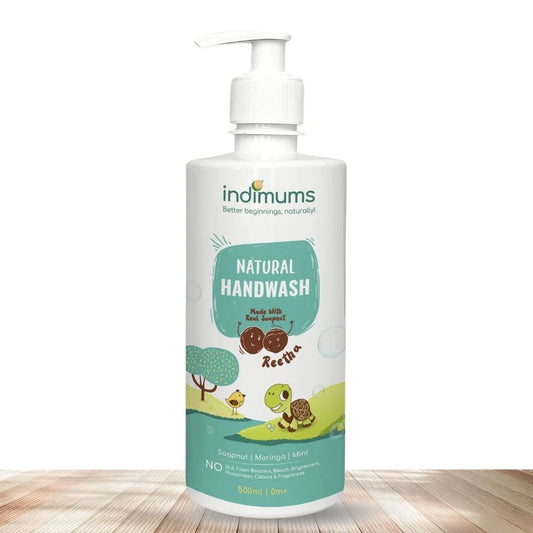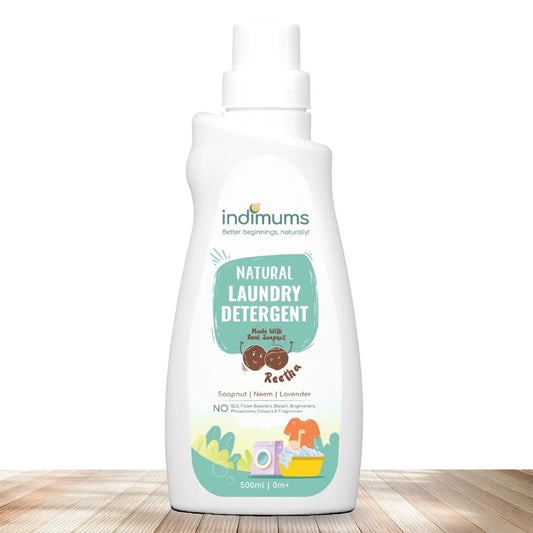Many parents and caregivers ask: “Can I use baby shampoo as a hand wash?” Especially with little ones around, or when you’re out of hand-wash supplies, the idea might seem convenient. In this blog we’ll cover what happens when you use a baby shampoo for hand‐washing, how it compares to a regular hand wash, when it might be okay (and when not), and how to choose safe alternatives.
Why this question arises
-
Baby shampoos are typically milder, “tear-free”, and marketed for delicate skin. So the thought: maybe it’s okay for hands too?
-
Hand washes often have stronger antimicrobial agents, fragrance, surfactants, or other additives — and for a baby’s hands (or even a parent’s sensitive hands) the gentler baby shampoo might seem appealing.
-
During busy times (travel, outdoors, limited supply) one might reach for whatever is available.
-
As a baby-care brand, Indimums hears this from customers: “Can I just use the baby shampoo I already have to wash my baby’s (or toddler’s) hands rather than buying a separate hand wash?”
So the good question: is it safe, effective, and appropriate?
How baby shampoo and hand wash differ?
When we talk about “baby shampoo as hand wash”, we’re comparing two types of products:
Baby Shampoo: formulated primarily to cleanse the scalp/hair of infants or toddlers. Characteristics typically include:
-
Gentler surfactants (less harsh on delicate skin and eyes)
-
Mild fragrance or none (depending on product)
-
“Tear-free” or low sting formulas
-
Possibly less aggressive in removing heavy oils, grime or microbial load
-
pH slightly tuned for scalp/hair rather than for hand hygiene
Hand Wash (for hands/hygiene): formulated for cleansing hands — which may include:
-
More robust surfactants to deal with oils, dirt, food residues, etc
-
Possibly antimicrobial or “germ-killing” claims (depending on local regulation)
-
Higher frequency of use, different skin conditions (hands versus baby scalp)
-
Fragrance or functional additives tuned for adult use or family use
Key points of difference: cleansing power (how well it lifts/dissolves oils, germs), formulation for the skin surface (scalp vs palms), and purpose (hair/scalp care vs hand hygiene).
From the research side: there are studies showing baby wash products (for infants) can preserve skin barrier function. Also baby bath product studies show surfactants and manufacturing process matter for irritation.
Thus it’s not automatically “safe and equivalent” to just swap them without consideration.
Is it effective as a hand wash? The “hygiene” angle
Here is where we need nuance. Washing hands is not just about mild cleansing — depending on context (food handling, outdoors, contact with germs) you might need more effective cleansing.
Key considerations:
-
A study found that diluted baby shampoo achieved a ~96.3% reduction in bacterial load on eyelid skin, comparable to povidone-iodine and isopropyl alcohol in that specific region. While that’s interesting, eyelid skin is very different from palms/hands, and the context was surgical scrub rather than casual hand‐wash use.
-
Hand hygiene research shows volumes, coverage, etc matter for effectiveness.
-
Regular hand wash products are often designed to remove oils, dirt, grime from palms and fingers, which may require more robust surfactants or longer wash/rinse time.
So while baby shampoo can clean hands (especially when lightly soiled or when you just need a gentle option), it may not always be the optimum choice when heavy contamination, outdoor use, or microbial risk is involved.
Indimums Hand Wash
- Protects tiny hands from germs, eliminating harmful bacteria
- Maintains natural skin balance and is gentle on sensitive skin
- Hypoallergenic and pH balanced, which minimizes risks of allergies
- Joyful introduction to handwashing with calming aroma and minty feel
- Suitable for all ages: newborns, babies, toddlers and adults
Learn more in our guide on Essential Tips for Washing Your Baby's Hands
Frequently Asked Questions (FAQs)
Q1. Is baby shampoo safe to wash hands with daily?
It could be safe for daily use on baby/toddler hands if hands are not heavily soiled and skin is healthy. But if your child’s hands are frequently dirty (outdoor play, food mess, etc), you might want a dedicated hand-wash product.
Q2. Can baby shampoo kill germs like a hand wash?
Not necessarily. While a study showed baby shampoo reduced bacterial load on eyelid skin comparably to antiseptics (96.3% reduction) in a specific test. That doesn’t mean every baby shampoo will meet “antibacterial” or “germ kill” claims for hands. Hand washes often have formulations and claims designed for this purpose.
Q3. How to choose a baby‐safe hand wash?
Look for: mild surfactants, low fragrance or fragrance-free, suitable for sensitive skin, good rinse, baby-safe certification/pediatric dermatologist recommended. Keep it separate from hair-care products so the formulation aligns with hand-washing needs.
Q4. What can I use instead of hand wash for my baby?
If you’re out of hand wash, a gentle baby shampoo is a reasonable temporary alternative — as described above. But ideally keep a baby-safe hand wash on hand (no pun intended!) so you’re prepared. Also, washing with soap + water (even if plain) is always better than skipping cleanses.





